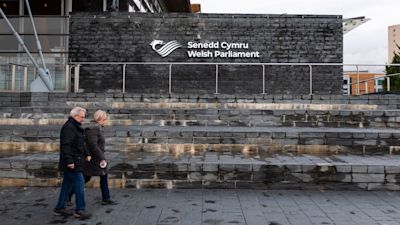Wales 'on course for closest devolved election in history', latest poll shows

Wales could be on course for the closest devolved election in history - and possibly the worst ever result for the Labour party, an exclusive poll for ITV Wales has shown.
The poll, conducted by YouGov for ITV Cymru Wales and Cardiff University, found Labour only two percentage points ahead of the Conservatives for the upcoming Senedd election in May.
The results from the poll of 1,174 Welsh voters aged 16 and over, found Labour is still projected to win the election with 32% of the vote.
This is followed by the Conservatives at 30% and Plaid Cymru at 23%.
Here are full results for the constituency ballot (with changes in support for each party since the last Barometer poll in January):
Labour: 32% (-2)
Conservative: 30% (+4)
Plaid Cymru: 23% (+1)
Liberal Democrats: 5% (+1)
Reform UK: 3% (-2)
Green Party: 2% (-4)
Others: 5% (+1)
Polling expert Prof Roger Awan-Scully from Cardiff University warns that the single poll should be treated with caution, but the results are close to what YouGov found in another recent poll for Wales Online.
He said, “They are also very much in line with the changes seen in recent Britain-wide polling, which has suggested some strengthening of the Conservative position and a modest Labour decline.
"The polling continues to indicate that there are three major parties in the contest for the Senedd. But, Labour’s status as the leading one of those parties no longer looks as if it can be taken for granted”.
Prof Awan-Scully has projected from the poll which seats would change hands if there was a uniform swing in support for the parties since the last Welsh election in May 2016.
On that basis, the Conservatives would make five constituency gains from Labour, and Plaid Cymru would take three gains from Labour including the seat of the First Minister, Mark Drakeford.
The Vale of Glamorgan, the Vale of Clwyd, Gower, Wrexham and Cardiff North are projected to be gained by the Tories.
Llanelli, Blaenau Gwent and Cardiff West are projected to go to Plaid Cymru.
Cardiff West was run close last time by Plaid Cymru’s Neil McEvoy. Mr McEvoy has since left Plaid Cymru, as has Plaid Cymru’s 2016 candidate in Blaenau Gwent.
Here are the poll results for the regional list vote. The new Barometer poll sees the following results, with changes since January’s poll in brackets.
Labour: 31% (+1)
Conservative: 28% (+3)
Plaid Cymru: 22% (-1)
Abolish the Welsh Assembly: 7% (no change)
Liberal Democrats: 4% (no change)
Green Party: 3% (-2)
Others: 4% (-2)
Polling continues to show that the anti-devolution Abolish the Welsh Assembly party has a level of support that might well win it some regional list seats in the Senedd.
Here is Professor Awan-Scully’s projection, though if Plaid Cymru gain fewer constituencies, it would be in the running for more regional list seats, affecting the Abolish the Welsh Assembly Party’s chances.
North Wales: 1 Labour, 1 Plaid, 1 Conservative, 1 Abolish the Assembly
Mid and West Wales: 2 Labour, 1 Conservative, 1 Abolish the Assembly
South Wales West: 2 Conservative, 2 Plaid
South Wales Central: 2 Conservative, 1 Plaid, 1 Abolish the Assembly
South Wales East: 2 Conservative, 1 Plaid, 1 Abolish the Assembly
So here is Prof Awan-Scully’s overall projected result for the Senedd:
Labour: 22 seats (19 constituency, 3 regional)
Conservatives: 19 seats (11 constituency, 8 regional)
Plaid Cymru: 14 seats (9 constituency, 5 regional)
Abolish the Assembly: 4 seats (4 regional)
Liberal Democrats: 1 seat (1 constituency)
“Labour must still be the strong favourites to be the largest party in the Senedd after the election", Professor Awan-Scully said.
"They still lead in all recent polls, and they have a track-record of having finished well ahead in all previous devolved Welsh elections; even in difficult years for Labour, none of their opponents have yet been able to come close to defeating them for first place.
"But the evidence from our latest poll does suggest that Labour’s dominance may be challenged more strongly than ever before in 2021”.
The next Westminster election is probably several years away, but the first poll of 2021 showed that Labour’s Welsh lead was suffering and the new poll suggests that it might have disappeared altogether.
ITV Wales' poll in January showed a striking decline in support for Labour in Wales - with a drop of 7% points - and that has dropped even further.
Here are the figures, with changes from the previous poll in brackets:
Labour: 35% (-1)
Conservative: 35% (+2)
Plaid Cymru: 17% (no change)
Liberal Democrats: 4% (+1)
Green Party: 3% (-1)
Reform UK: 2% (-3)
Others: 3% (+1)
Prof Awan-Scully has projected from the figures the following result in terms of parliamentary seats, again assuming a uniform swing across Wales:
Labour: 19 (-3)
Conservatives: 16 (+2)
Plaid Cymru: 5 (+1)
The Conservatives are projected to narrowly gain Alyn and Deeside, Newport West and Gower, all of which they came quite close to gaining in 2019.
However, the Conservatives on this projection would lose Ynys Mon to Plaid Cymru.
Ynys Mon is the one seat that will emerge unchanged from the current review of parliamentary boundaries, as it’s been protected as an island constituency. The rest will be redrawn as part of the reduction in the number of Welsh MPs at Westminster, from 40 to 32.
The Welsh Political Barometer poll, for ITV Cymru Wales and Cardiff University, had a sample of 1,174 Welsh voters aged 16+ and was carried out online by YouGov on16-19 March 2021. Figures for Westminster voting intention reflect only those respondents aged 18 and over. The margin of error is estimated at +/-4%.